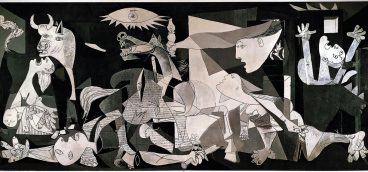Sympathy for the Devil: Quantum Theatre Conjures a Postmodern Faust

Perhaps the second most essential question in life after “Why are we here?” is “Whom should we trust?” The obvious answer would seem to be, trust in God, but we all know how often human beings end up putting their faith in that more convenient, self-serving, and nefarious alternative, the devil. In fact, one of the most archetypal characters in all of literature is Faust, who famously sold his soul to the devil in a bargain that is so common we use the word Faustian as an adjective. One might protest and say, here goes another critic using an example from fiction to make a point about life. However, out of the greatest classic figures of Western literature — which would have to include Odysseus, Oedipus, Hamlet, and Don Quixote — only Faust is based on a real, historical person. Trust me, his myth is not fictive.
Taking up the existential issue of trust in a brilliant new production is Quantum Theatre’s world premiere of “The Devil is a Lie,” the clever title of which should be a clue that there is something deeper and more subtle going on here. Because if you walk in thinking you know who the devil is, you will have that belief challenged before the evening is over.
Ostensibly set up as an investor meeting for a start-up company called Voltaire, the audience is offered real drinks at a bar in the antechamber of the downtown Frick Building – in what could be a real-world location for such a pitch meeting — then enters the presentation room comprising an elevated, thrust stage that looks more like a fashion runway than a corporate presentation space. The “Voltaire” logo – colored a sinister, neon-purple — is projected on two giant screens above the far end of the room, over an exposed technical area and DJ stand. Although an appropriate name for a technology company, the real Voltaire — an Enlightenment philosophe who celebrated science and rationality over religious orthodoxy and dogmatism in any form — would have despised the Doric Greek column in the design motif, as he was an ardent critic of neoclassicism and the backwardness it represented.
It would be difficult to analyze this work by playwright Jennifer Chang without giving away the plot, but I will say that this is not merely a rehash of the Faust legend gleaned from such famous precursors as Marlowe’s “Dr. Faustus,” and Goethe’s “Faust,” although elements of both are incorporated here. This play is more swerve than recursion, and shares just as much with those postmodernist, cinematic antecedents that utilize technological contrivances to achieve their effects, such as “Star Trek,” “Solaris,” and “The Matrix.” But most of all, it’s certainly a work of the present day, bearing a strong affinity to the film “Everything Everywhere All at Once” in its reliance on time travel as a plot device, as well as the idea that people, even those you know well, are often not whom they seem to be.

Perhaps most impressively, director Kyle Haden integrates three very sophisticated forms of dramatic presentation into one production: “immersive,” “interactive,” and “choose-your-own-outcome” theater styles that each, in themselves, are difficult to pull off. (And this being a Quantum show it is also, by definition, “site-specific” in that it takes place in a commercial building, not a playhouse.) So you may find yourself being asked to recite a line by one of the actors, or being addressed directly by them during the action, as in effect, you are an actor yourself the minute you take your seat.
The immersive and interactive components are self-explanatory, but the third style, which places the outcome of various scenes in the audience’s hands, is achieved literally in this production by the use of smartphones, which enable viewers to vote in the manner of an online poll regarding what will happen to specific characters in specific scenes.
This conceit is certainly fun, but as a trend will most likely play itself out in a few years, much as on-stage video projections did over the prior decade, once the novelty wears off. Is the use of Wi-Fi audience communication in a performance a postmodernist innovation, or a pedestrian gimmick? Probably both, but it reminded me of going to children’s theater in grade school when an actor would turn to us in the audience and ask, should we save this character? And all the children would scream out, “Yes!” In both cases, there is a cathartic sense of empowerment, but with smartphones, there is hardly the same fulfillment in tapping a digital button as there is screaming your lungs out.
The four actors in “The Devil is a Lie” are all strong, and most play double roles as they find themselves transmogrified during the production, due to the machinations of the devilish power that shapes their destinies. Lisa Sanaye Dring, as Lucy, plays what is in essence the classic Mephistopheles persona, in that she has the dual obligation of serving both her employer George Fast – the hyperbolic founder of Voltaire – as well as her true master, the devil, an off-stage presence that constantly makes itself known, like the eerie lighting in an old horror film.
Dring’s performance is scintillating – especially her extended monologue early in the show, when we first learn that things with George Fast (Sam Turich), and his company, are not what they seem. Her character, and that of Dogg (LaTrea Rembert) are the most developed, whereas Fast, and his wife Margarita (Christine Weber) are more one-dimensional and cartoonish in their conception, as this seems to be a play of ideas that is willing to sacrifice the interiority of its subjects to make its point.
This dichotomy is the only potential flaw of the playscript, which alternates between the real human dialogue of fear and pathos, and a didactic, Marxist-preachiness such as Lucy’s declaration, “Yeah, no white saviors in this story! Are there white saviors in any real story? That’s just Hollywood. And colonialism. Image.”
That George Fast is presented as a loud, egotistical, arrogant and sartorially challenged (red tennis shoes with plaid suit) CEO is somewhat distancing; we can never conjure any empathy for him, as he’s a walking cliché. And his wife is the standard abused sidekick, pregnant and pitiful. It would have been more interesting if these characters were portrayed with a greater sense of individuation, making their outcomes something in which we could be further invested. But this kind of one-dimensionality is a common by-product of plays that resort to allegory rather than character development to achieve their ends. This is one reason why we rarely encounter hollow characters in Shakespeare, for example, and moreover, why his plays enlighten without being didactic. In fact, we know virtually nothing about his beliefs, which is perhaps why his works remain so vital four centuries after their birth.
Dogg (who may be a pre-celebrity rapper worm-holed from 1991), as written — as well as interpreted by Mr. Rembert — is given a full range of humanness and, although he is not an archetype like the other characters, may be the most universal, as we feel the pain of his life choices and the trepidation in which he considers them.
Adding a fiendish glow to the atmosphere is C. Todd Brown’s incandescent lighting, which lurks in the diabolical unctuousness between purple and pink: we feel as if we are walking through a graveyard of neon signs in an abandoned Las Vegas amusement park.
Howard Patterson’s sound work is integral to the success of the production, as are Grzegorz Labuda’s costumes, some of which are truly scary (Lucy’s spine sticking through her tattered clothes after a trip to hell evokes the Creature from the Black Lagoon). Davine Byon’s projections – including all the voting polls — went off flawlessly, and Sasha Schwartz’s set allowed for an exceptional immersive experience.
The great French director Jean-Luc Godard famously said of the creative youth of the 1960s, that they were “the children of Marx and Coca-Cola.” After seeing this play, which is emblematic of the creative youth of the 2020s, I would say his comment is still relevant, but would call this generation “the children of Marx and Apple Computer.”
Ultimately, after all the harsh admonitions to silence my cell phone over the past 25 years of attending plays, I must admit I felt very guilty not only leaving it on, but actively using it during this show. However, it was a lot of fun, especially because the devil made me do it.
# # #
THE DEVIL IS A LIE continues through April 30th at the Frick Building, 437 Grant Street, Downtown. $38-58. 412-362-1713 or www.quantumtheatre.com















